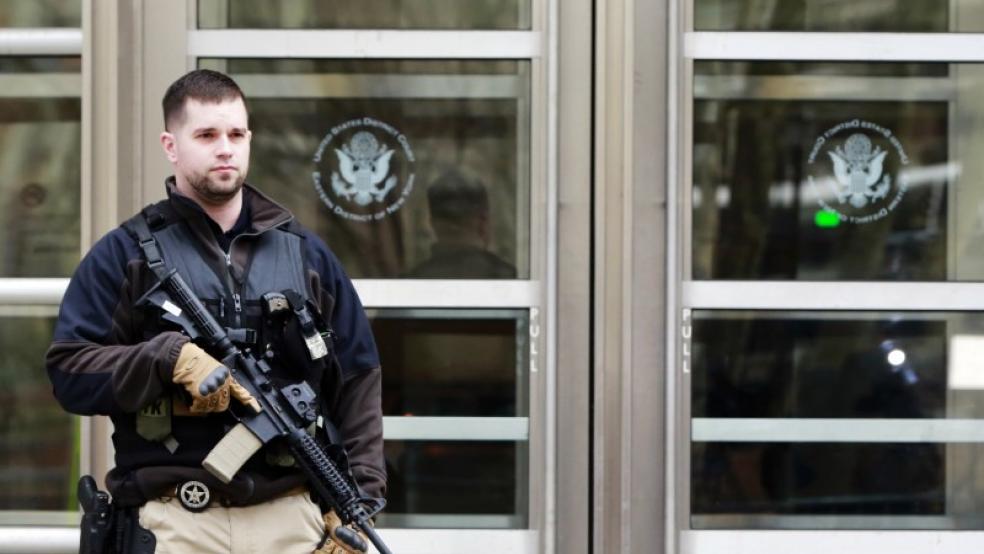MEXICO CITY (Reuters) - Mexico and the United States are looking into whether armed U.S. federal air marshals could be deployed on commercial cross-border flights, according to a document seen by Reuters and a Mexican official, as Mexico deepens security ties with its neighbor.
Since Donald Trump took office, U.S and Mexican officials have said that Mexico has tried to improve cooperation with its top trade partner on security, immigration, and foreign policy, hoping to convince the U.S. president to take a softer stance on the North American Free Trade Agreement (NAFTA). In 2003, in the wake of the 9/11 attacks on the United States, Mexico agreed to place Mexican security agents on certain flights, but said it would never allow U.S. officials on board its commercial airlines, let alone armed.However, in a Jan. 18 meeting in Mexico's foreign ministry, officials from both countries agreed to "study the convenience of negotiating an agreement for the deployment of Federal Air Marshals on commercial flights," according to the official Mexican document seen by Reuters.U.S. Federal Air Marshal Service spokesman Thomas Kelly declined to answer questions on the proposed agreement, but said air marshals "are armed Federal Law Enforcement Officers with the mission of in-flight protection of U.S.-flagged aircraft, crewmembers and passengers."In a statement, Mexico's foreign ministry confirmed that the government is evaluating the plan's potential operational and security benefits but added that no agreement has yet been reached.A Mexican official with knowledge of the plan said the hardest part of the negotiations would center on allowing U.S. officials to carry arms, given that the use of weapons by foreigners in Mexico is sensitive and tightly regulated. The U.S. Department of Homeland Security (DHS) places sharp-shooters on domestic and international commercial flights to and from the United States to prevent militant attacks. The Mexican official said it was still to be decided if the air marshals would fly on just U.S.-bound flights, Mexico-bound flights, or both. There is no set date for when the agreement might be struck, or come into effect, the official said. It was not immediately clear if the marshals would travel solely on U.S.-owned airlines or also on Mexican carriers.The document shows that Mexico and the United States have agreed to several other security measures to tackle "transnational criminal organizations."The two countries plan to create a bilateral investigative body for probing international criminal groups.There are also plans to negotiate a maritime drug seizures treaty, and use ships and radars for specific operations. The two nations also want to deepen efforts to eradicate opium and marijuana plantations. Additionally, the document showed that Mexico and the United States agreed "to identify specific transnational criminal organizations, map their business models in both countries and design a joint operational strategy to combat them."NAFTA CONCERNSThe foreign ministry has pushed hard to defend NAFTA ahead of a July 2018 election in which the ruling Institutional Revolutionary Party is currently polling third. Mexico, Canada and the United States are currently in the midst of fraught negotiations to reshape NAFTA, a lynchpin of the Mexican economy that Trump has threatened to abandon.Trump's trade chief rejected Canadian proposals for unblocking NAFTA modernization talks on Monday but pledged to seek "breakthroughs" by late February, easing concerns that Washington would soon withdraw from the trilateral pact.Many in the Mexican government believe a U.S. NAFTA exit before the July election would strengthen the challenge of leftist front-runner Andres Manuel Lopez Obrador, who some in Washington view as a threat to bilateral cooperation.Foreign Minister Luis Videgaray said in September that he views cooperation with the United States as the best way to achieve Mexico's foreign policy aims. Mexico bolstered anti-narcotics collaboration last year as U.S. concern mounted over heroin-related deaths, inviting U.S. officials to inspect the army's opium poppy eradication efforts. Mexico's army has long been wary of U.S. intrusion in its affairs.Mexico has also hewed closer to the United States on sensitive foreign policy issues including Venezuela, North Korea, Israel and Honduras. (Reporting by Gabriel Stargardter; editing by Diane Craft)Exclusive: U.S., Mexico explore placing armed U.S. air marshals on flights

Shannon Stapleton



